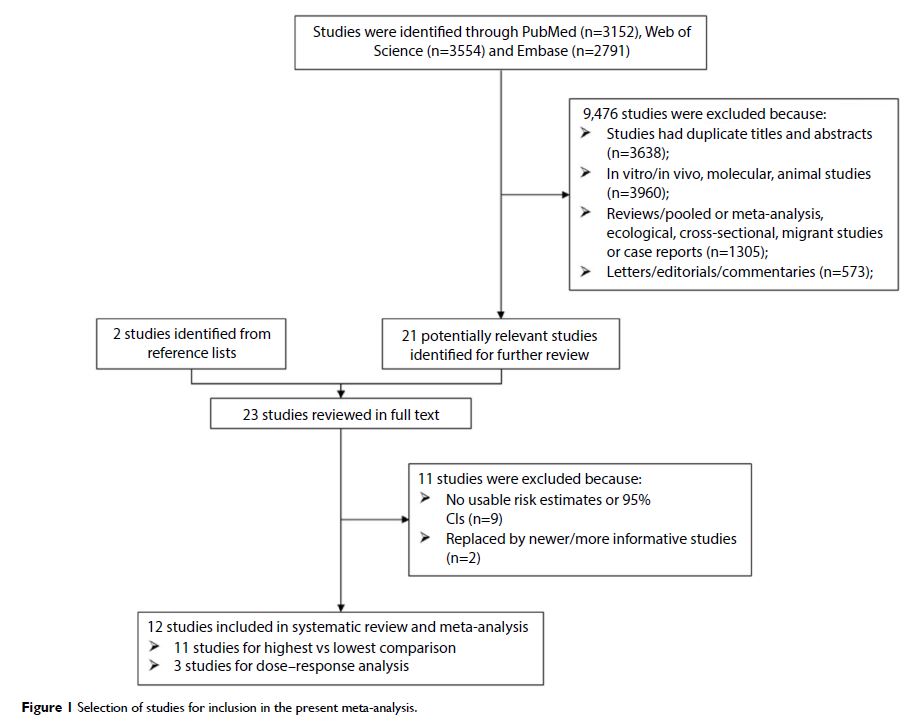108985
论文已发表
注册即可获取德孚的最新动态
IF 收录期刊
- 3.4 Breast Cancer (Dove Med Press)
- 3.2 Clin Epidemiol
- 2.6 Cancer Manag Res
- 2.9 Infect Drug Resist
- 3.7 Clin Interv Aging
- 5.1 Drug Des Dev Ther
- 3.1 Int J Chronic Obstr
- 6.6 Int J Nanomed
- 2.6 Int J Women's Health
- 2.9 Neuropsych Dis Treat
- 2.8 OncoTargets Ther
- 2.0 Patient Prefer Adher
- 2.2 Ther Clin Risk Manag
- 2.5 J Pain Res
- 3.0 Diabet Metab Synd Ob
- 3.2 Psychol Res Behav Ma
- 3.4 Nat Sci Sleep
- 1.8 Pharmgenomics Pers Med
- 2.0 Risk Manag Healthc Policy
- 4.1 J Inflamm Res
- 2.0 Int J Gen Med
- 3.4 J Hepatocell Carcinoma
- 3.0 J Asthma Allergy
- 2.2 Clin Cosmet Investig Dermatol
- 2.4 J Multidiscip Healthc

术前血清白蛋白在上皮性卵巢癌患者中的预后意义:一个系统回顾和观察性研究的剂量反应荟萃分析
Authors Ge LN, Wang F
Received 8 January 2018
Accepted for publication 26 February 2018
Published 17 April 2018 Volume 2018:10 Pages 815—825
DOI https://doi.org/10.2147/CMAR.S161876
Checked for plagiarism Yes
Review by Single-blind
Peer reviewers approved by Dr Andrew Yee
Peer reviewer comments 3
Editor who approved publication: Professor Kenan Onel
Purpose: To comprehensively assess the impact of preoperative serum albumin
levels on survival of patients with epithelial ovarian cancer (EOC).
Materials and
methods: Two independent researchers searched
the PubMed, Embase, and Web of Science databases to identify relevant studies
from inception to October 20, 2017. The studies were independently reviewed and
those deemed eligible were selected based on predetermined selection criteria.
Summarized HRs and 95% CIs were calculated for overall survival (OS) with a
profile likelihood random-effects model.
Results: Twelve cohort studies comprising 3884 EOC patients were included for
analysis. Comparison of the highest vs the lowest categories of preoperative
serum albumin yielded a summarized HR of 0.63 (95% CI=0.45–0.88, I 2=88.8%). Although the results were robust in all subgroup analyses
stratified by International Federation of Gynecology and Obstetrics (FIGO)
stage, cutoff definition, geographical location, quality of study, number of
EOC cases, follow-up time, and adjustments made for potential confounders, not
all were statistically significant. Of note, dose–response analysis showed that
for each 10 g/L increment in preoperative serum albumin level, the summary HR
was 0.56 (95% CI=0.35–0.92, I 2=78.6%). No evidence of publication bias was detected by funnel plot
analysis and formal statistical tests. Sensitivity analyses showed no important
differences in the estimates of effects.
Conclusion: The present meta-analysis suggests that preoperative serum albumin can
be used as an independent prognostic predictor of OS in EOC patients. Since the
included studies had high heterogeneity and retrospective designs, these
results require further validation with prospective cohort trials enrolling
larger patient populations with longer follow-up examinations.
Keywords: albumin, meta-analysis, ovarian cancer, preoperative, prognosis
